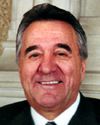Mr. Speaker, it is a pleasure for me to rise to address this bill. Before I get into the main part of my speech I want to congratulate the government and the special legislative committee on Bill C-17 for passing 25 amendments that deleted the expression “inexplosive ammunition component” from part 7 of Bill C-17. We worked very hard in trying to get rid of these particular parts of the bill. It was just absurd that they were being put into legislation. It would have created another mess, probably similar to the firearms fiasco.
In particular I would like to thank the office of the member for Port Moody—Coquitlam—Port Coquitlam for working with my office to identify, draft and submit the amendments for consideration by the committee. I must also recognize the member for Churchill, as her office also submitted identical amendments.
The committee owes a debt of gratitude to James M. Hinter, national president, and David A. Tomlinson, legal chairman, of the National Firearms Association, as well as Tony Bernardo, the executive director of the Canadian Shooting Sports Association, for appearing before us and encouraging us to stop short of “criminalizing brass and lead”, in Mr. Hinter's words, and, in the words of Tony Bernardo, “regulating little bits of margarine containers, little pieces of cotton fabric and fishing sinkers”.
The committee must also thank those members of Canada's film and television community who wrote to committee members to inform us of the negative impact, especially on the production of action movies, of including the term “inexplosive ammunition component” in part 7 of Bill C-17.
The words “inexplosive ammunition component” first appeared in part V of Bill C-42. That was the first predecessor of Bill C-17 which we are debating today. They appeared on November 22, 2001. That bill was so flawed that the government withdrew it four months later, but in the interim, a Library of Parliament research paper prepared on January 18, 2002, by Gérald Lafrenière, pointed out the potential problems of regulating inexplosive ammunition components. Naturally, when the Liberals brought back Bill C-42 as Bill C-55 on April 29, 2002, I hoped that they had read the Library of Parliament report. They had not and on May 9, 2002, exactly a year ago today, I told the House the following:
The trouble with the [inexplosive ammunition component] sections is that they will most likely hit the wrong target by potentially criminalizing tens of thousands of law-abiding citizens who load their own ammunition for legal pastimes and sports.
Consequently, law-abiding citizens who manufacture their own ammunition would end up being charged with the new offences proposed in the amendments, offences that call for fines up to $500,000 and imprisonment of up to five years in jail.
Offences that are targeting law-abiding Canadians in this act include: acquiring, possessing, selling, offering for sale, transporting or delivering any illicit inexplosive ammunition component and making or manufacturing any explosive from an illicitly trafficked inexplosive ammunition component. The government has not told us how it thinks anyone can make an explosive from an inexplosive ammunition component. The definition in the act states “inexplosive ammunition component” means any cartridge case or bullet, or any projectile that is used in a firearm as defined in section 2 of the criminal code.
Even the government's own definition clearly demonstrates that no one could possibly make an explosive out of inexplosive ammunition components. I would like to propose at the appropriate time that an amendment be made to remove all references to inexplosive ammunition components from the proposed amendments to the explosives act.
That was exactly a year ago today.
Bill C-55 died on the Order Paper on September 16, 2002, and was brought back in slightly modified form as Bill C-17 on October 21. Again the Liberals missed the opportunity to delete the term “inexplosive ammunition component” from the bill. On Monday, November 18, 2002, I spoke on Bill C-17 at second reading and once again called for removal of all references to “inexplosive ammunition components” from the bill.
I am glad to note that some of the members of other parties were listening. I believe that the hard work of members of the firearms community, the film and television community and various members of the committee, including the members for Port Moody—Coquitlam—Port Coquitlam and Churchill, as well as some of the Liberal members, helped to convince a majority of Liberal members of the committee that this particular change was essential to making Bill C-17 more acceptable to Canadians, and I thank them.
It is quite clear that the committee state version of Bill C-17 is a definite improvement over Bill C-42 as first presented 17 months ago, but more changes, particularly in the area of increased parliamentary scrutiny, are required.
If Canadians were prepared to sacrifice their liberties for the promise of increased security in the aftermath of September 11, that feeling has faded in the intervening year and a half. For this reason, the government would be wise to carefully consider increased parliamentary scrutiny on the same level as the Emergencies Act if it wants opposition parties to support Bill C-17.
The report stage of Bill C-17, an act to amend certain Acts of Canada, and to enact measures for implementing the Biological and Toxin Weapons Convention, in order to enhance public safety, otherwise known as the Public Safety Act, will be the subject of the rest of my speech.
I would like to divide my remarks in the remaining time I have into three general categories: general comments on the bill, continuing concerns about the bill's broad use of interim orders, and our reaction to what the committee did. I have already done the third part.
I would like to trace a little of the history of the bill because those watching and reading the Hansard record will of course probably forget how this all began. There are many parts of it that go to trying to make Canadians feel safe in a post-September 11 world, but that is part of the bill's problem. It was first drafted in reaction to the terrible terrorist attack on the United States on September 11, 2001.
As I end my remarks today, I would like to make this point. If the true measure of a man is what he does rather than what he says, then the measure of a country must be in part its reaction to times of trial and stress. In the United States 10 days after the September 11 attack, Senator Fritz Hollings was on his feet to introduce America's reaction, S.1447, “a bill to improve aviation security, and for other purposes”. With lightning speed, and despite an anthrax scare on Capitol Hill, both the House of Representatives and the Senate quickly passed the legislation and President Bush signed it on November 19, 2001. That is right: from the time the first airplane hit the first tower to the moment President Bush signed his approval of the new bill, barely 10 weeks passed.
During the same 10 weeks this Liberal government slept. In fact it was a full three days after President Bush signed the U.S. law that this Liberal government tabled the first version of the public safety act, then called Bill C-42, on November 22. That bill lived for five months, never went to any committee and was withdrawn on April 24, 2002.
Five days later, the Liberal government introduced Bill C-42's replacement, Bill C-55. It was so complex that a special committee was struck on May 9 solely for the purpose of studying it, but that committee never met. Bill C-55 died on the Order Paper on September 16, 2002, when Parliament prorogued.
I think we can get the drift. Inaction is what marked this government. In fact, the current legislation, Bill C-17, was not tabled in the House until October 31, 2002, fully 13 months after the September 11 attack and nearly 11 months after President Bush signed America's aviation and transportation security act into legislation as public law 107-71.
It is now May 9, 2003, and this bill is just coming back to us from a special legislative committee. There will be debate and hopefully further amendments, and then votes. Then the bill will presumably be referred to the Senate for deliberation. It is unlikely that Bill C-17 will be ready to receive royal assent before October.
September 11 happened and the U.S. had a law signed by the President and in place on November 18, roughly two months later. Canada will not have its law in place until nearly two years have passed. That is simply unacceptable. If it takes a Liberal dominated Parliament two years to react to a major crisis, that is a strong argument for a change in government.
I want to conclude by making people aware that the government should be judged by what it does, not by what it says, and that this bill is a clear indication of the inaction of the government in the face of a crisis.






















































